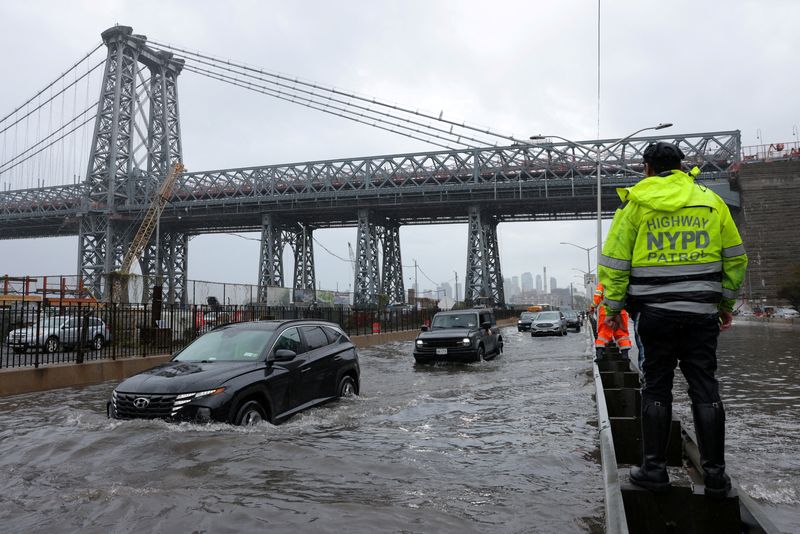By Timothy Gardner
WASHINGTON (Reuters) -Climate change harms Americans physically, mentally and financially, often hitting those who have done the least to cause it, including Black people facing floods in the South and minorities enduring searing heat in cities, a federal report said on Tuesday.
More than a dozen U.S. agencies and about 750 scientists produced the National Climate Assessment, meant to crystallize the top science on the problem and communicate it to wide audiences, President Joe Biden said at the White House.
"This assessment shows us in clear scientific terms that climate change is impacting all regions, all sectors of the Untied States," he said. "It warns that more action is still badly needed. We can't be complacent."
This year set a record for extreme weather events that cost over $1 billion, with costly floods, fires and storms occurring roughly every three weeks. In the 1980s, by comparison, the United States experienced a billion-dollar disaster only once every four months.
Climate change is increasingly imposing costs on Americans, as prices rise for weather-related insurance or certain foods. Medical costs are also going up as more people struggle with climate consequences such as extreme heat, the report said.
Biden said he had seen firsthand the devastating toll of climate change when visiting areas hit by historic hurricanes, floods and wildfires, and said it was "foolish" for some Republicans to deny the impacts of climate change.
"This summer and this fall have been the Earth's hottest since global records began to be kept in the 1800s," he said. "The impacts we're seeing are only going to get worse, more frequent, more ferocious and more costly."
Last year, he said, natural disasters caused $178 billion in damages in the United States, often hitting the most vulnerable the hardest.
The assessment marks the fifth such report released by the U.S. government since 2000. It was peer-reviewed by the National Academies of Sciences, Engineering and Medicine.
Atmospheric scientist Katharine Hayhoe, a report coauthor since the second assessment, said the newest version reflects the latest in climate science and can help policymakers and companies working on emissions cuts and ways of adapting to the consequences of a warming world.
"Today, we can document the risks that we face, per degree of warming," Hayhoe told reporters on a call. "We can put a number on the extent to which climate change is fueling our record-breaking weather extremes, and we are starting to tap the interconnectivity and understand the vulnerability of our systems from socioeconomics to national security."
It was the first report produced since 2018, when the administration of then-President Donald Trump was dismantling rules meant to rein in climate-warming emissions. Trump, a Republican who denies the science of climate change, also dismissed the 2018 assessment.
Biden, a Democrat, said the report was the most comprehensive assessment yet on the state of climate change in the U.S. and announced more than $6 billion in funding for climate resilience projects including bolstering the power grid and reducing flood risks.
POVERTY LINE
For the first time, this year's assessment includes a chapter on economics that illustrates how costly damages are distributed unevenly across society, often amplifying existing inequalities. It includes a new online tool that shows the impact in states, cities and counties.
Children are reporting mental-health distress due to climate anxiety. Outdoor workers experiencing dehydration through extreme heat are suffering acute kidney illness after only one day of exposure to extreme temperatures, the report says.
"Families living below the poverty line often live where climatic changes are expected to be the most economically damaging, like the already-hot Southeast," the report says.
The report also said, referring to the U.S. Southeast, that slavery, segregation and housing discrimination have resulted in many Black and other minority communities living in neighborhoods exposed to environmental risks and with fewer resources to address them compared with white neighborhoods.
It was not all doom and gloom, though. With shuttered coal plants being replaced by natural gas and renewables, the country's energy-related greenhouse gas emissions fell some 12% between 2005 and 2019 - even as the economy and population both grew.
"We're pointing in the right direction, we just want to do more, faster," said Ted Schuur, a professor of ecosystem ecology at Northern Arizona University who was not involved in writing the report.
The study's findings could encourage local and state policymakers to consider ways of adapting to the coming climate disruption, such as redesigning sewer systems to better drain water from flood-prone city streets, creating cooling centers in heat-vulnerable cities or helping hospitals plan for likely increases in vector-borne diseases, as warming encourages mosquitoes and ticks to move north into new areas.

The report also discusses national security risks of climate change, as countries compete for resources needed in the energy transition. Competition with China for minerals, for example, will likely escalate tensions between the two countries in coming years.
Climate migration, meanwhile, is expected to become a high-security risk by 2030 as people living in climate-vulnerable nations seek to cross the border into the United States for safety, the report says.